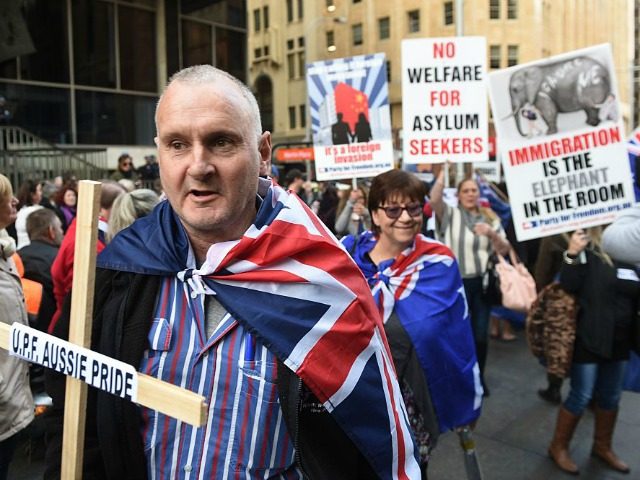A new poll has found that 49 per cent of Australians support a ban on Muslim immigration, a huge jump from last October when only 28 per cent backed the idea.
The Essential Research survey also revealed 48 per cent of voters would welcome a national debate on the issue, and showed that two thirds of Australians agree that populist senator Pauline Hanson talks about topics other politicians are afraid to bring up.
The top reasons for wanting a ban were fears over terrorism, and a belief that Muslim migrants do not integrate nor share Australian values. The poll was first conducted in early August and then repeated to ensure the results were not outliers.
Writing in The Guardian about the results, Essential Research pollster Peter Lewis says his polling company decided to ask whether people opposed a ban following Ms. Hanson’s maiden speech in the Senate. In it, the populist One Nation party politician proposed Australia end Muslim migration and stop building mosques and Islamic schools.
Mr. Lewis expresses horror at the number of people sceptical of mass Muslim migration and that large numbers of Labour and Green voters also back a ban.
Sixty per cent of respondents who support the right-wing Coalition favour an end to Muslim migration along with 40 per cent of Labour voters and 34 per cent of Green voters.
“Floored” by the results, the pollster laments that the “basket of deplorables”, who he previously thought were just a “marginalised rump, out of step with the views of modern, mainstream, cosmopolitan Australia”, is too big to ignore.
He writes: “This not a ‘basket of deplorables’ who sit outside the confines of polite society, that is 49% of the men and women who make up our nation.
“Yes, they are more likely to vote Coalition or ‘other’ but 40% of Labor voters and one third of Greens agree too. Look around you right now, there are people in your workplace, in your street, on your train, who agree with Hanson.”
Mr Lewis asserts that voters’ fears over migration are due to increasing feelings of job insecurity among Australians.
He points to this week’s Essential Research report, which revealed a quarter of voters think their jobs will be less secure in the next two years, and that just one third expect to be working with the same employer in five years time.
With a question asking what constitutes the biggest threat to job security in Australia, the top response was “free trade deals that allow foreign workers into the Australian labour market”. A third of respondents opted for this as their answer.
Mr. Lewis asserts: “While the political insiders see rising insecurity as the natural consequence of technology and our economic affluence, the majority of Australians see it as the outcome of conscious decisions made by their leaders.
“Someone feeling insecure does not cheer for free trade deals or see the spread of labour hire and contracting out as the way to reduce costs and make businesses more productive. They endure these decisions and then when they are personally affected, they resent them.”
On the topic of how political elites can deal with Australians who have views he says are informed by “underlying ignorance and mindless stereotypes”, Mr. Lewis claims:
“So here’s the challenge to everyone concerned or affronted by these findings. How do you tell half the population that they are wrong?”
The best course of action to challenge Ms. Hanson and her supporters, he concludes, is to talk about “unfashionable ideas [such] as income distribution, workplace bargaining rights, industry development and corporate responsibility.”

COMMENTS
Please let us know if you're having issues with commenting.